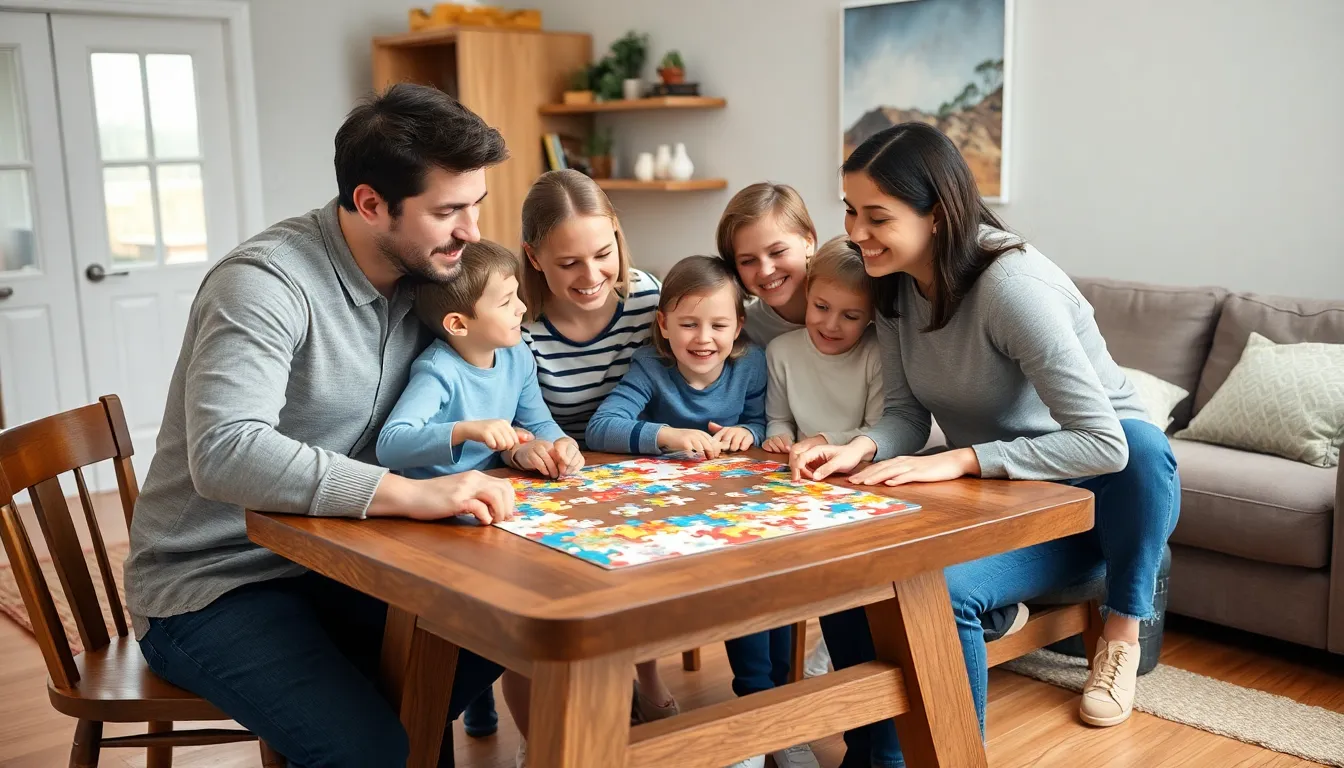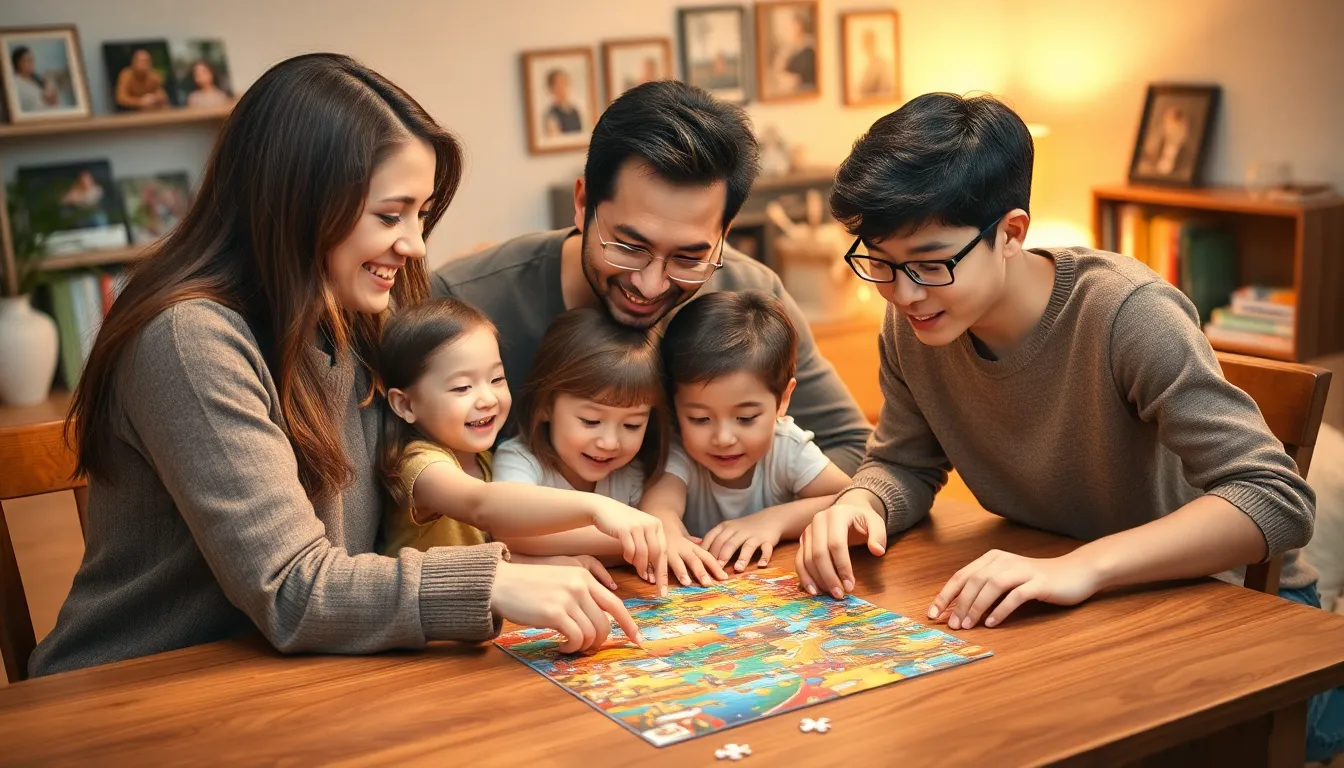Table of Contents
ToggleImagine a rainy afternoon where the kids are bouncing off the walls and the Wi-Fi decides to take a vacation. Enter family puzzle games—the ultimate antidote to chaos! These delightful brain teasers not only keep everyone entertained but also spark laughter and bonding moments that even the most stubborn teenager can’t resist.
Overview of Family Puzzle Games
Family puzzle games engage every family member, from toddlers to grandparents. These games come in various formats, including jigsaw puzzles, logic puzzles, and word games, making them versatile for different preferences. They supply an enjoyable way to spend time together, enhancing communication and cooperation among players.
Puzzle games challenge critical thinking and problem-solving skills. By working together, family members learn to collaborate and support each other through difficult challenges. Some types of puzzles encourage creativity, while others focus on strategy, providing something for everyone.
Statistics indicate that family game nights boost relationships among participants. Families that engage in games regularly show improved socialization and communication skills. Specific games, like Sudoku or crosswords, target cognitive development, making them not only fun but also beneficial.
Affordability stands out in the appeal of these games. Many puzzles are accessible at local stores or online, often ranging from $10 to $50, depending on complexity and brand. Moreover, many games can be enjoyed multiple times, providing lasting value for families.
Diverse themes and difficulty levels exist, ensuring that everyone finds something suitable. Families might choose puzzles depicting favorite movies, scenic landscapes, or even personalized images. Such options cater to different ages and interests, keeping every participant engaged.
Family puzzle games serve as an excellent way to bond and create lasting memories while enhancing cognitive and social skills. These games provide endless fun, encouraging families to disconnect and reconnect meaningfully.
Benefits of Playing Family Puzzle Games

Family puzzle games offer numerous benefits that contribute to a family’s overall well-being. Engaging in these activities promotes both fun and development across various age groups.
Encourages Family Bonding
Playing puzzle games creates opportunities for family members to connect. Laughter and shared experiences naturally strengthen relationships among participants. Task-focused discussions arise during gameplay, encouraging open communication. Families often find themselves collaborating to solve challenges, fostering teamwork. Game nights lead to unforgettable memories that families treasure for years. Engaging together cultivates a sense of belonging, helping individuals feel valued and understood within the family unit.
Enhances Cognitive Skills
Involvement in puzzle games enhances cognitive skills through critical thinking and problem-solving. Families tackle complex puzzles that require strategic planning and logical reasoning. Players often develop perseverance as they face challenging tasks together. Games like Sudoku sharpen mathematical abilities, while crosswords expand vocabulary and language skills. Regular participation boosts memory retention, increasing mental agility over time. Keeping the mind active through such activities helps maintain cognitive health as children and adults age.
Types of Family Puzzle Games
Family puzzle games encompass a variety of formats that cater to different tastes and preferences. These options keep family members engaged while fostering teamwork and communication.
Jigsaw Puzzles
Jigsaw puzzles invite families to piece together colorful images, often featuring landscapes, animals, or beloved characters. They vary in complexity, making them suitable for all age groups, from toddlers to adults. Completing a jigsaw puzzle requires cooperation, as family members discuss strategies and help one another find missing pieces. A typical puzzle can range from 100 to 1,000 pieces, allowing families to choose based on their skill level and available time. Research indicates that these puzzles enhance problem-solving skills and patience.
Logic Puzzles
Logic puzzles challenge families to think critically and solve problems through deduction. Types of logic puzzles include Sudoku, crosswords, and riddles. Each offers unique challenges that test analytical skills and foster creative thinking. Many involve a series of clues or constraints, pushing players to work together and enhance their reasoning abilities. Families can enjoy these puzzles in varying difficulty levels, making them a great choice for groups with mixed ages. Regular engagement with logic puzzles supports cognitive development and boosts memory retention.
Digital Puzzle Games
Digital puzzle games provide families with interactive entertainment while fostering competition and collaboration. Platforms such as mobile apps and online games feature a wide range of options, from match-3 puzzles to escape room challenges. These games often include engaging storylines, captivating graphics, and multiplayer modes, appealing to all ages. Families can connect virtually or in-person, fostering bonding through shared challenges. Many digital puzzle games offer free-to-play models, making them accessible for different budgets. Research shows that digital gaming can also enhance hand-eye coordination and quick decision-making skills.
Tips for Choosing the Right Family Puzzle Game
Selecting a family puzzle game involves considering various factors to ensure it matches everyone’s interests.
Age Appropriateness
Families should prioritize games suitable for all age groups. Choose puzzles designed for specific age ranges, from toddlers to grandparents, to enhance participation. For instance, games featuring larger pieces or simpler concepts work well for younger children. Likewise, older family members may enjoy more complex puzzles that challenge their thinking. Look for games that present age recommendations on the box. These indicators help ensure everyone can actively engage and enjoy the gaming experience without frustration.
Skill Levels
Consider the diverse skill levels within the family when selecting a puzzle game. Some family members may excel at strategy games, while others prefer simpler formats. A variety of difficulty levels offers something for everyone. For example, choose advanced logic puzzles for experienced players while including beginner options for those just starting. Balance in skill levels allows all family members to contribute and enjoy the game equally. Many puzzle games showcase skill ratings, making it easier to pick appropriate options.
Family puzzle games offer a unique blend of entertainment and bonding opportunities. They not only engage family members of all ages but also promote essential skills like critical thinking and cooperation. By setting aside time for these games, families can create lasting memories while enhancing cognitive abilities.
With a variety of options available, from jigsaw puzzles to digital formats, there’s something for everyone. The affordability and replayability of these games make them an excellent investment in family time. Embracing family puzzle games can lead to stronger relationships and a more connected home environment.




